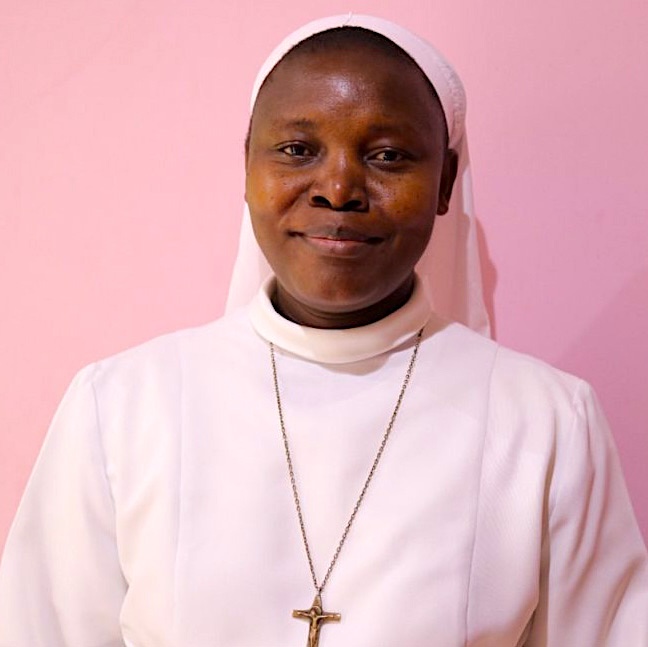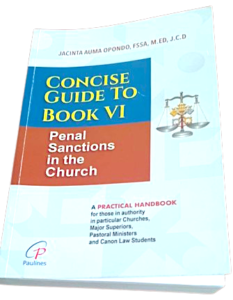KENYA: Catholic Nun Simplifies Revised Canon Law Book for Ease of Pastoral Governance

Sr. Jacinta Auma Opondo
Sr. Jecinter Antoinette Okoth, FSSA
After the Holy Father Pope Francis promulgated the revised 1983 Code of Canon Law for the Western Latin Church, Book VI, on sanctions in the Church, which took effect December 8, 2021, a Catholic nun has published a practical handbook as an easy-to-use guide, especially for those in the position of authority in the Church.
In the new book titled “Concise Guide to Book VI: Penal Sanctions in the Church,” the Canon lawyer Sr. Jacinta Auma Opondo a member of the Franciscan Sisters of St. Anna (FSSA) explores the changes in the new Book VI, providing practical examples when major superiors, pastoral ministers and Canon lawyers may require to apply penal law.
“The revision of Book VI of the Code of Canon Law poses a number of challenges given that not all Ordinaries as well as major superiors are canonists,” Sr. Opondo narrated what informed the book which seems to be the first commentary after the revision of the 1983 Code of Canon Law adding that, “the revised text calls for the imposition of a penal precept, or the initiation of the process to impose a penalty, as long as the authority considers it prudently necessary,” hence the need to make the understanding of the revised Book VI easy for anyone who has not studied law.
Sr. Opondo notes that whenever a law is revised, it calls for creating awareness for better understanding, since “a person who is unaware of a law may not escape liability for violating that law merely by being unaware of its content.” Besides, as the Church is widening the tent of those being involved with church administration including both the laity and consecrated persons, and with members of parishes and faith communities raising more complex and complicated issues, “understanding Book VI of the Code of Canon Law is vital.”
Revision of the book that was promulgated over four decades ago in the Church by Pope John Paul II (Saint) was guided by the principle of protecting the community, repairing scandal, and compensating for damage.
In this case, Sr. Opondo who is currently the Deputy Principal for Academic Affairs at Hekima University College in Kenya says, “Those who are at the head of a Church or major superior of Institutes of Consecrated Life and Societies of Apostolic Life may be faced with new questions and implementation challenges following the revision of Book VI of the 1983 Code of Canon Law. At the same time, Commentaries to the Code of Canon law can provide the answers to some of the most complicated questions, but busy pastoral ministers do not always know where or how to find those answers.”
The over 300-page book with thirteen titles is divided into two parts: Offenses and punishments in general and Particular offenses and penalties established for them.
Addressing one of the concerns in the ongoing synod on synodality about ‘Women in the life and mission of the Church,’ the Canonist in part two of her book, talks about the offense of attempting to confer a sacred order on women which is currently can. 1379 in the revised Book VI and advices that “synod on synodality is a wake-up call to pastorally and culturally recognize, acknowledge, embrace and practice what the Church has always acknowledged, namely that women have a role to play in the Church that no one else can play.”
Referencing the Blessed Virgin Mary, Mother of the Church, who received neither the mission proper to the Apostles nor the ministerial priesthood, and yet is ranked above the Apostles and their successors, the Franciscan nun points out that the “non-admission of women to priestly ordination does not mean women are of lesser dignity, nor can it be construed as discrimination against them.”
She appreciates the women’s role in the Church highlighting key figures with outstanding virtues including, Mother Teresa of Calcutta, Saint Clare, and St. Teresa of Avila. St. Teresa of Avila and St. Catherine of Siena who have left writings so rich in spiritual doctrine that made Pope Paul VI include them among the Doctors of the Church. Besides, “many Christian wives have had a profound influence on their families, particularly for the passing on of the faith to their children.”
Sr. Opondo encourages those in positions of authority in the Church to have a copy of the new practical handbook for easy-to-use reference.


